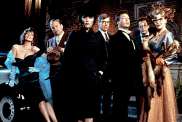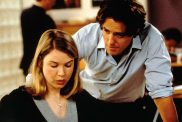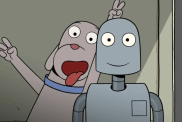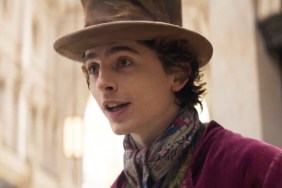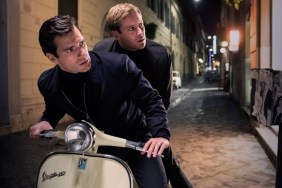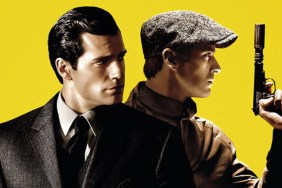Interview with The Man from U.N.C.L.E. director Guy Ritchie
From the moment he exploded onto the movie scene with 1998’s Lock, Stock and Two Smoking Barrels, British filmmaker Guy Ritchie has continually gone against the grain of expectations and with 2009’s Sherlock Holmes, which teamed Robert Downey Jr. with Jude Law, he showed that he could play with other people’s toys within the studio system, while still doing something original and creative with them.
That continues to be true with his decision to tackle a movie based on the popular ‘60s television spy show The Man from U.N.C.L.E, starring Henry Cavill and Armie Hammer as Napoleon Solo and Ilya Kuryakin, the characters made famous by Robert Vaughn and David McCallum. Rather than bringing them into the modern day, Ritchie has maintained the ‘60s setting with Solo being one of the CIA’s top agents and Kuryakin doing the same for the KGB on the other side of the Cold War. Together, they need to stop a group of former Nazis that are trying to get power by kidnapping a German nuclear physicist and the two agents call upon his daughter Gaby, played by the glorious Alicia Vikander.
As you can see from our recent review, it’s a smashingly original take on the spy genre, as one might expect from Ritchie, and earlier this week, ComingSoon.net sat down in a hotel lounge with Ritchie to talk about the movie. Joining us was Ritchie’s regular collaborator, writer and producer Lionel Wigram, who first worked with Ritchie on the Sherlock Holmes movie and continues to work with him for the currently-filming summer ‘16 release Knights of the Roundtable: King Arthur (which we also spoke about briefly).
ComingSoon.net: I know Warner Brothers had been developing this project for a long time. They had remake rights and they had a lot of different actors involved, maybe even Tom Cruise was involved at one point. There were a lot of different permutations. So how did you and Lionel get involved? What was it that interested the two of you?
Guy Ritchie: Someone fired the idea of this (at us). After the “Sherlocks,” different suggestions were made about what our next project was going to be. This was the only title that I found to be stimulating immediately. We went through all these titles, and then someone said, “Oh, how about ‘The Man from U.N.C.L.E.’?” Within 10 seconds, I was all over it. I thought, “Oh yeah, I could just do a job on that,” simply because in retrospect, I remember how I wanted to capture the tone and the fun of the TV series without overthinking it. Within 10 seconds, I thought, “Oh yeah. I remember that. I remember the fun of it. Now let’s try and capture the fun of it.” It really wasn’t any more complicated than that. I just believed that people would want to see it, although the title is not really known.
CS: Was it just a matter of them having a list of titles of things that they had in development or had the rights to?
Ritchie: Yeah, I think it was. Well, there’s various different conduits where you derive your creative interests and what your next project’s going to be. But this was straight up and down, Warner threw it out as an idea and it’s in there. I mean, as you said yourself, the script that we inherited, it had 30 different writer’s names on it. There was nothing we could do with any of that, but we just liked the title and we liked the tone of the TV series, so we dumped everything that came before and we started again.
CS: It’s interesting that Ian Fleming was involved with the original TV series as a consultant.
Ritchie: Yeah, he was. It’s funny, isn’t it? It’s funny.

Ritchie: Yeah, it was kind of a big deal in the UK. It was a sort of fan club and I had a barman in London, who was still a card carrying member of U.N.C.L.E. So it was kind of a big thing. I only remember it from the reruns in the ’70s. But it was a big deal back then, too.
CS: I wanted to ask you about Lionel, but obviously he’s here so it’s going to be kind of embarrassing to ask about him. I’m really curious because even after “Sherlock” you guys came and did this and you worked together a lot. Can you talk about Lionel and how you guys connected?
Ritchie: I think it’s much easier for me to have a partner in this game because you just do. I mean, I think it’s just infinitely more efficient if you’ve got a partner in crime. Actually, you can really talk ideas through, particularly if that partner is also a creative and has the ability to write. Lionel has the ability to write. So we’re both very practical in that sense. So what Lionel and I are interested in doing is making films manifest. We like to think we’re relatively judicious about what it is that we choose, but once we’ve decided we’ve chosen something and we’ll do whatever we can to make it manifest because we’re both right. So we’re terribly pragmatic in that sense. Once we’ve come up with an idea, we’re both good at making sure that the idea actually comes to something. Lionel brings certain attributes that I can’t bring to the party and vice versa. But it means that you can have, without having too many pots boiling, that you can have enough pots boiling. I think it’s very hard to do if you’re just on your own.
CS: I think in one of our conversations you were saying about how you weren’t writing as much because it takes you away from directing too long.
Ritchie: There’s no question that writing is the most painful and arduous process in the entire equation, because it’s not active like directing is active. Directing on the day is people give me a lot of ingredients and I’m the chef, right? But at least the ingredients are on the table and I just have to sort of act. It’s an interactive experience. Writing is not like that. Writing is you and a typewriter or Lionel, myself and two typewriters, you know? So you have to be much more proactive about that than you do about any other element of filmmaking, so hence, we think it’s really important that we both liked. Lionel would not be sitting where he’s sitting if he didn’t write.
CS: I’d be very disappointed if you guys actually didn’t have two physical typewriters for this one because of the nature of it being a period piece.
Ritchie: Oh no, we did it all on a typewriter, so you’re not disappointed.
CS: It was an interesting decision to keep it in the ’60s, because that’s of the things that sets it apart from a lot of other spy movies these days. We’re trying to modernize things like Bond and trying to incorporate everything that’s going on in the world today, which would’ve missed the purpose of the original show in some ways.
Ritchie: We feel the sort of Golden Age of the spy genre was really the ‘60s. The clothes were more interesting, the cars are more interesting. The birth of gadgets happened really in the ‘60s. You had what have become fundamental requisites such as the Cold War and atomic energy and all of that sort of stuff, which sort of is very conducive to the spy genre. It wasn’t just that, it was the general aesthetic of the ‘60s we found appealing, more appealing than the contemporary one. I would say it felt fresh. It felt like we were doing something that no one else was doing, although we’re in the same genre as the spy genre.
CS: It’s somewhat odd that your former producing partner Matthew Vaughn also did a spy movie this year only with a very different approach.
Ritchie: Yeah, it was funny. We were shooting and he was in one studio next to me and I was in the other studio. We used to nip over there for lunch, so we were making it at the same time and we didn’t know anything really about his. He must’ve known more about ours because he was Robert Vaughn. He’s called Matt Vaughn, so for that period, everyone, including Matthew, thought that his father was Robert Vaughn for 30 odd years. (Note: We think Guy was making a joke at his friend’s expense.)
CS: Let’s talk about the casting. Both Armie and Henry are great in those roles, but they’re not who you’d expect for a movie like this.
Ritchie: Yeah, it’s a funny process, the casting process is because really it’s boiling down of who you get on with and finding out who’s going to harmonize best on set. That’s really why they were chosen because they just need to get the right tone.

CS: Did you get them together to see how they played off each other and stuff?
Ritchie: Yeah, yeah.
CS: I think because they both had played kind of iconic roles before in Superman and the Lone Ranger, it may be hard to imagine them doing other things, but it definitely worked.
Ritchie: Yeah, well we made an effort to give them both quite a strong character, and there should be no correlation between any of the aforementioned titles and this, right? So Henry shouldn’t be playing Superman and Armie’s definitely not playing the Lone Ranger.
CS: Was there a question about who would play whom? Was it always that specific?
Ritchie: Actually, no, because when Tom Cruise was involved, Tom was going to play Solo.
CS: That’s what I was assuming, yeah.
Ritchie: Yeah, and Superman, we were quite interested in as Illya Kurayakin. However, he was so dark, the idea of him sporting a blonde head of hair was kind of camp and didn’t really work. So Armie was leading the charge on that, but Henry was very good at it. Then when it didn’t work out –I can’t remember for what reason–with Tom, then it just made sense that Henry should just fit straight in and be Tom’s character.
CS: It’d be kind of weird if he played Ethan Hunt and Napoleon Solo, because they’re two of the biggest TV spy characters from that era.
Ritchie: Yeah, that’s really why it didn’t work.
CS: I can’t imagine that.
Lionel Wigram: He had a great idea how to subvert the Tom Cruise persona. It was very clever. It would’ve been your version of Tom Cruise.
Ritchie: Yeah, my version of Tom Cruise was not Tom Cruise at all.
CS: Let’s talk about the music. I thought Daniel Penderton’s score on this is brilliant, one of the best I’ve heard and he’s not like Hans Zimmer who has done a ton of movies. He’s done mostly TV. Can you talk about working with him and how important that music was?
Ritchie: Do you mind if Lionel talks about this?
Wigram: It’s fascinating for me as a producer, seeing the director direct a composer. Daniel has an enormous amount of raw talent. He came to us with interesting ‘60s sounding demo stuff, which is why we hired him, but ultimately, this is really Guy’s vision for the score and down to specific notes and orchestration and all that kind of stuff. Guy was heavily, heavily involved in every tune and really directed Daniel in a great way. So I thought it was a really great collaboration in that sense. Daniel learned a lot from him and Guy got to have his musical jollies as well, so it was a good combination.
CS: How important is music to your movies? Do you get involved with that aspect very early on, even before you start shooting?
Ritchie: Yeah, there was a momentum that came with “U.N.C.L.E.” which developed when I started realizing how important the soundtrack was becoming because it was a part of the aesthetic and it just took on a momentum gradually, which became more and more significant. So it just became an important element.
Wigram: Yeah, music’s instrumental in your films.
Ritchie: Yeah, I’m never sure if the story’s more important than the music or more important than the story. It’s a whole wrestling match that takes between the two and in the end, you end up if you like your music heavy and obvious, you end up where we’ve ended up.

CS: You went right from that into “Knights of the Roundtable” which are also quite iconic characters, probably on par with “Sherlock Holmes” in some ways.
Ritchie: We’d been playing around with that idea for a long time, Lionel in his way, myself in my way, and then we found a sort of a thing that would work, which wasn’t his idea or my idea, it was Joby Harold’s idea. Joby Harold came up with a rather good idea on how to make it work without making it too concentrated. The problem with the story is that you can’t do it in two hours, right? So you can do one character in two hours. You can’t do all the characters in two hours. That was really the fundamental problem with “King Arthur.” So anyway, that was a real creative challenge in the same way “U.N.C.L.E.” was when I was writing. Here’s the idea and then go and make it. “King Arthur’s” the same. There isn’t really a particular creative expression that captures the “King Arthur” idea, right? So in a way, no one’s done it. The only thing was in the ’80s, I think 1980 was Excalibur. Everything else is sort of silly.
CS: It’s sort of ambitious, though, because I understand you want to try and do six movies for the different characters and that’s really the impetus for people doing these things as TV shows now.
Wigram: We’ll see how the first one goes. We’ll see how many movies we end up doing. Obviously, it’s a fantastic story. We’d like to do many, many movies. Let’s see how it goes, but what I would say about this is I think the reason why “King Arthur” is such an important story just generally is because of these universal themes that cover what it’s like to be human. I think that what’s interesting about this is Guy’s interpretation of that, of those guys. So I think you’ll recognize the classic Arthurian secret themes, but done in a very different way.
CS: Also, for a movie like “U.N.C.L.E.” you had certain touchtones for the visuals, and you have a few “King Arthur” movies like “Excalibur,” “Knights of the Roundtable.” Are you trying to approach it visually different from other movies as well?
Ritchie: Yeah, we tried being as original as we can. Only you can be the judge of whether we succeeded in that, but the idea is to present something that you feel as though hasn’t been presented before. We’re trying not to tread over well-trodden ground.
CS: What about “U.N.C.L.E.?” Have you thought ahead about doing more with those characters? The movie ends in a place where you kind of want to see more with them.
Ritchie: Again, we can’t predict the future, so we’d all be very keen to make another one.
Wigram: Yeah, we’d love to do another one. We’d love to. We had a great time.
Ritchie: They’re great fun to make.
Wigram: And we have all sorts of ideas if we get lucky enough to do it, but we’ll see.
CS: You’ve established such a good working relationship with Warners from “Sherlock Holmes” through “U.N.C.L.E.” You started out very much independently making your own movies, so at this point, do they just trust you guys to let you make the movies you want to make?
Ritchie: They pretty much trust us, but they’re also, in our experience, very helpful and they’ve been nothing but collaborative and helpful, frankly. I mean, there’s no reason for us to go elsewhere because they’ve made life so comfortable, and not just comfortable, helpful for us.
Wigram: Absolutely.
Ritchie: So the question has never arisen “should we go anywhere else?” because life’s so helpful and comfortable there, really, isn’t it?
Wigram: I just want to say about Guy that he’s very open to collaboration and it’s a very important part of the process, hearing what other people think and bouncing ideas off people. Warner Brothers has been a really good sounding board creatively. Also, as far as the marketing campaign for “Man from U.N.C.L.E.” is concerned, especially, it’s brilliant.
CS: The Comic-Con panel was absolutely amazing. I don’t think I was really sold on this until I saw it there.
Ritchie: All the artwork they’ve done, it’s pretty great artwork. We saw a new trailer yesterday, and the music on it is so good.
Wigram: Yeah, I feel that they loved this film and they were truly inspired by the idea and actually stepped up to bring their marketing materials and their advertising to the level of the film so it does really reflect the style and the originality of our film, which is pretty great.
The Man from U.N.C.L.E. opens nationwide on Friday, August 14.
The Man From UNCLE
-
The Man From U.N.C.L.E.

-
The Man From U.N.C.L.E.

-
The Man From U.N.C.L.E.

-
The Man From U.N.C.L.E.

-
The Man From U.N.C.L.E.

-
The Man From U.N.C.L.E.

-
The Man From U.N.C.L.E.

-
The Man From U.N.C.L.E.

-
The Man From U.N.C.L.E.

-
The Man From U.N.C.L.E.

-
The Man From U.N.C.L.E.

-
The Man From U.N.C.L.E.

-
The Man From U.N.C.L.E.

-
The Man From U.N.C.L.E.

-
The Man From U.N.C.L.E.

-
The Man From U.N.C.L.E.

-
The Man From U.N.C.L.E.

-
The Man From U.N.C.L.E.

-
The Man From U.N.C.L.E.

-
The Man From U.N.C.L.E.

-
The Man From U.N.C.L.E.

-
The Man From U.N.C.L.E.

-
The Man From U.N.C.L.E.

-
The Man From U.N.C.L.E.

-
The Man From U.N.C.L.E.

-
The Man From U.N.C.L.E.

-
The Man From U.N.C.L.E.

-
The Man From U.N.C.L.E.

-
The Man From U.N.C.L.E.

-
The Man From U.N.C.L.E.

-
The Man From U.N.C.L.E.

-
The Man From U.N.C.L.E.

-
The Man From U.N.C.L.E.

-
The Man From U.N.C.L.E.

-
The Man From U.N.C.L.E.

-
The Man From U.N.C.L.E.

-
The Man From U.N.C.L.E.

-
The Man From U.N.C.L.E.

-
The Man From U.N.C.L.E.

-
The Man From U.N.C.L.E.

-
The Man From U.N.C.L.E.

-
The Man From U.N.C.L.E.

-
The Man From U.N.C.L.E.

